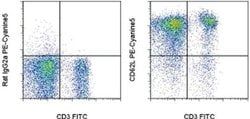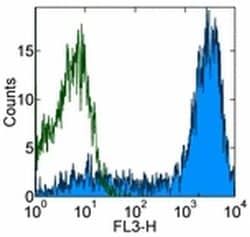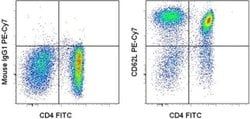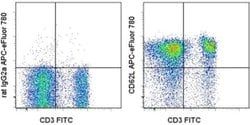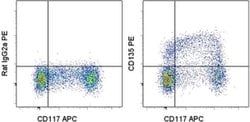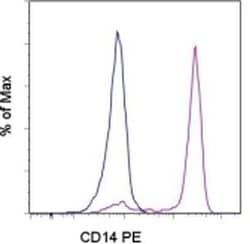CD62L (L-Selectin) Monoclonal Antibody (MEL-14), APC-eFluor™ 780, eBioscience™, Invitrogen™
Manufacturer: Fischer Scientific
Select a Size
| Pack Size | SKU | Availability | Price |
|---|---|---|---|
| Each of 1 | 50-112-9560-Each-of-1 | In Stock | ₹ 11,392.00 |
50-112-9560 - Each of 1
In Stock
Quantity
1
Base Price: ₹ 11,392.00
GST (18%): ₹ 2,050.56
Total Price: ₹ 13,442.56
Antigen
CD62L (L-Selectin)
Classification
Monoclonal
Concentration
0.2 mg/mL
Formulation
PBS with 0.09% sodium azide; pH 7.2
Gene Accession No.
P18337
Gene Symbols
SELL
Purification Method
Affinity chromatography
Regulatory Status
RUO
Gene ID (Entrez)
20343
Content And Storage
4° C, store in dark, DO NOT FREEZE!
Form
Liquid
Applications
Flow Cytometry
Clone
MEL-14
Conjugate
APC-eFluor 780
Gene
SELL
Gene Alias
A.11; AI528707; CD62 antigen-like family member L; CD62L; gp90-MEL; hLHRc; LAM1; LAM-1; LECAM1; LECAM-1; LEU8; Leu-8; Leukocyte adhesion molecule 1; leukocyte surface antigen Leu-8; Leukocyte-endothelial cell adhesion molecule 1; LNHR; LSEL; L-selectin; Ly22; Ly-22; LYAM1; Lyam-1; Ly-m22; Lymph node homing receptor; lymphocyte adhesion molecule 1; lymphocyte antigen 22; Lymphocyte surface MEL-14 antigen; pln homing receptor; PLNHR; SELE; selectin E (endothelial adhesion molecule 1); selectin L; selectin L (lymphocyte adhesion molecule 1); selectin, lymphocyte; Sell; TQ1
Host Species
Rat
Quantity
25 μg
Primary or Secondary
Primary
Target Species
Mouse
Product Type
Antibody
Isotype
IgG2a κ
Related Products
Description
- Description: The MEL-14 monoclonal antibody reacts with mouse CD62L, a 76 kDa member of the selectin family
- CD62L is expressed by neutrophils, monocytes, and subsets of T, B, and NK cells and binds a number of glycosylated, fucosylated, sulfated sialylated glycoproteins including CD34, glycam-1 and MAdCam-1
- These interactions mediate rolling of lymphocytes on activated endothelium at the sites of inflammation and homing of cells to the high endothelial venules (HEV) of peripheral lymphoid tissues
- Applications Reported: This MEL-14 antibody has been reported for use in flow cytometric analysis
- Applications Tested: This MEL-14 antibody has been tested by flow cytometric analysis of mouse splenocytes
- This can be used at less than or equal to 0.125 μg per test
- A test is defined as the amount (μg) of antibody that will stain a cell sample in a final volume of 100 μL
- Cell number should be determined empirically but can range from 10^5 to 10^8 cells/test
- It is recommended that the antibody be carefully titrated for optimal performance in the assay of interest
- APC-eFluor 780 emits at 780 nm and is excited with the Red laser (633 nm)
- Please make sure that your instrument is capable of detecting this fluorochome
- Light sensitivity: This tandem is sensitive to photo-induced oxidation
- Please protect this vial and stained samples from light
- Fixation: Samples can be stored in IC Fixation Buffer (cat
- The human CD62L is a 74-95 kDa glycoprotein member of the selectin family of adhesion receptors
- L-Selectin is comprised of an aminoterminal C-type lectin binding domain, an epidermal growth factor-like domain, two short consensus repeat (SCR) sequences homologous to those found in complement binding proteins, a short spacer region, a transmembrane region and a short cytoplasmic region
- Human CD62L (L-Selectin) is constitutively expressed on all classes of leukocytes including lymphocytes (except a substantial population of memory T cells), monocytes and polymorphonuclear cells.

